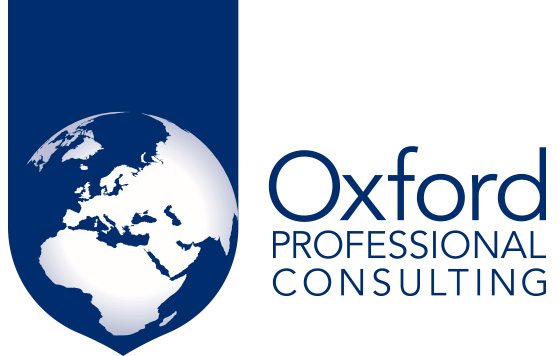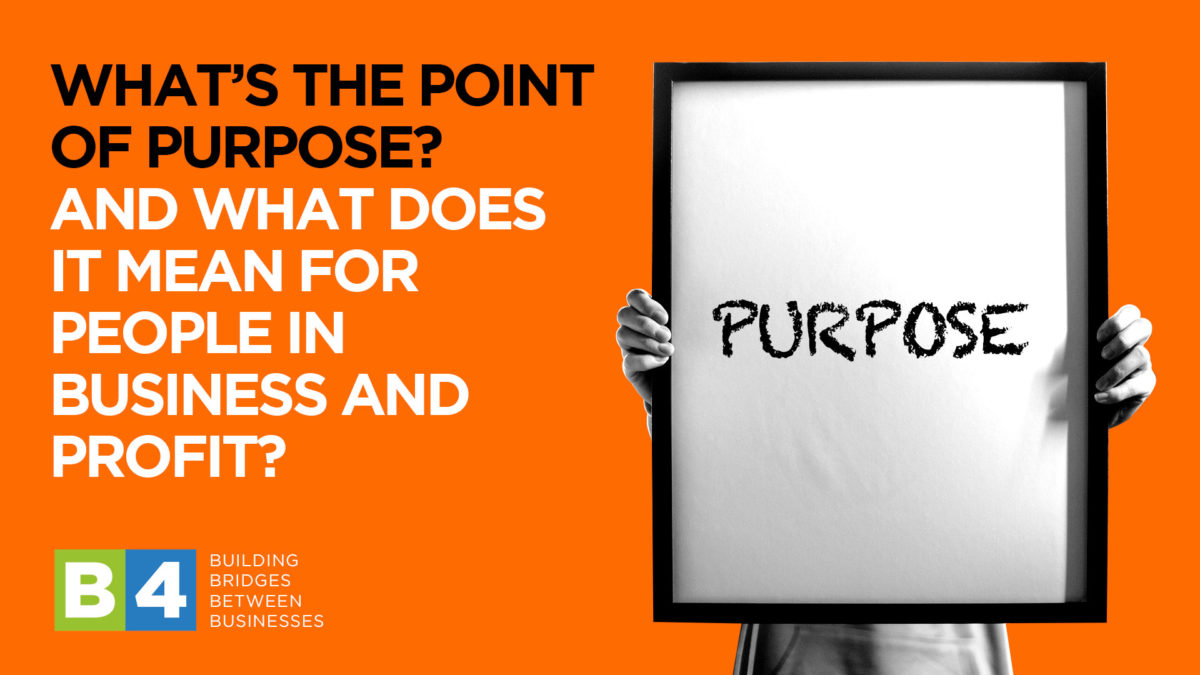
What’s the point of purpose?
And what does it mean for people in business and profit? We asked some B4 members to share their understanding of what this means to them, their businesses and the world today.
Purpose. Being purposeful. Having a purpose centred business, and/or life even. It’s a term that’s increasingly and now commonly used, but what does it really mean? Is it a marketing message? Is it the centre of culture development and strategic thinking? Is it an un-necessary diversion from ‘real business’ or is it how businesses will be judged by consumers, buyers and citizens in the future, who look to business to be a force for good – a contributor, leader even – in Social value creation?
We asked some B4 members to share their understanding of what this means to them, their businesses and the world today:
Stephen Cook, V. Purposeful Strategy
Purpose is one of the most hotly debated subjects in business today. It has certainly moved into some serious areas of business leadership thinking, organisational conduct and operation.
Central to this is whether a business has profit making as its driving purpose or something else that is purposeful but also delivers profit. Is business in business to grow shareholder value, or stakeholder value (employees, customers, ecosystems, communities and society etc.) or both?
Research has proven that over the last 25 years, Fortune 100 top performing companies are consistently those with purpose at their core (average 4-8% year on year higher profit returns).
In terms of value creation, employee engagement & wellbeing, talent recruitment & retention, productivity, investment, innovation strategy, supply chain management, manufacturing, M&A activity, customer engagement, partner and alliance development, place-making and much else, it is a similar, improving story.
We are well past the point now where purpose is a shiny nice to have statement of intent and into an era where it has significant contribution to make to business development, planning, outcomes – and profitability.
It does take a really concerted effort to build business strategic rigour into purpose development but the evidence is now proving that this effort is well worth engaging in.

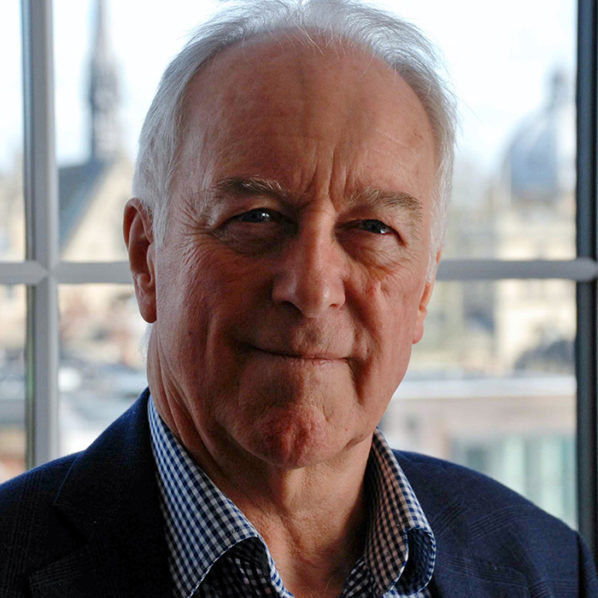

Stephen Clarke, Cherwell College Oxford
So, what is the purpose of business, and what does it mean specifically to directors and shareholders? Shareholders are generally focused on the return on their investment, which is the purpose of them investing their money. Directors have a clear purpose to fulfil their roles and job description to achieve the company goals. The business has a purpose to produce goods or services and to be successful within their sector. Purpose could be entangled with aim/goal/vision but should interpret as: intention; reason; drive! These are key qualities for any business to be successful.
Helen Money, Helen Money Nutrition
Core to any business is the people. Purpose is instrumental in driving behaviours that support wellbeing and ultimately productivity and performance. Purpose is a reason for people to make healthy foods choices, or choices that support their lifestyle. From my experience a common theme of anxiety around eating has occurred in athletes during Lockdown. Athletes who train for several hours a day and have been unable to do so are confused over their purpose for eating, leading to suboptimal choices. The business environment is not much different, if a person has a sense of purpose they make choices, including those around diet, that will support their performance for the given purpose. And arguably businesses should equip employees with wellbeing support to make them fit for purpose.
However understanding purpose – the reason for doing something, is paramount. For example, the purpose of hunger is to tell us to eat, should we therefore just eat to stop hunger? No, the true purpose of hunger is to tell us to eat foods that provide the body with nutrients that support wellbeing and performance. Purpose is important but unless understood is just faff and nonsense.



Linda Hughes, Dynamic HR Coach
A recent study from LinkedIn reported that 49% of employees would trade a portion of their salary to continue in their current role with an added sense of purpose.
Most people want to make a positive impact on the lives of others, be it their team, company, or on the wider society. And in many cases, their jobs do have a positive impact, but they are too far removed from the result to truly understand how they can benefit others.
To permeate work with a greater sense of purpose, organisations need to focus on the how and the why. The ‘why’ is the company vision – what the company stands for and what they strive to achieve. The ‘how’ are the company values – these are the fundamental beliefs of the company. They define how employees behave, work, interact with one another, and ultimately, guide the company on the right path to fulfilling its long-term goals.
Teams that truly thrive are bound by a collective respect for the company vision and values and united in a higher sense of purpose in their work. When people are motivated to work towards the bigger picture and long-term goals of the company, that’s when the purpose really shines through.
Alison Haill, Oxford Professional Consulting
Purpose can be linked to outcome – both help create an impact. If we act without an outcome or purpose in mind, we may distract ourselves and others. This is not to say that spontaneous acts of kindness are out! They should be welcomed – especially today.
Keeping an eye on our purpose and the outcomes we want to create helps us choose actions that bring us nearer to the results we want to see.
On a very practical level, just ask yourself “What outcomes do I want from this meeting?”. It helps you to think more clearly and be more effective.
Then ask: “How does this link to my/our wider purpose?”
If you haven’t discussed or decided on your purpose, consider outcomes as a first step.
Grant Hayward, Collaborent
The lack of understanding and confusion around what “Purpose” is, similarly with Corporate Social Responsibility (CSR), results in companies missing out on significant opportunities to strengthen and grow their business, and becoming far more financially sustainable. I’d also suggest that, just like CSR, the misuse of the term, consciously or through a lack of understanding creates cynicism and concerns similar to “Greenwash”. It also means that society, the environment and local economies aren’t benefiting as much as they could – and should.
But we have been seeing a significant shift, accelerated by the current crisis, contributing an “awakening” recognising businesses can be a Force for Good. There is also more awareness that to be successful, all stakeholders need to be placed on the same footing as shareholders.
Each business must determine its own “purpose”. For some, addressing specific social or environmental issues, solving a problem or fulfilling a need, it’s perhaps clear. But all businesses, even well-established, mainstream companies, can develop a purpose deeper and wider than just making a profit. This can be achieved by considering key elements such as its workforce, customer, suppliers, local communities and the environment, and how these can all fulfil a purpose more than just a resultant profit.
Closing remarks
It’s clear from these colourful and diverse perspectives that “Purpose”, perhaps, takes a variety of forms or simply means different things to each of us in our different roles, businesses and industries.
We will all be able to dive deeply into these areas with a series of purposeful B4 activities over the coming months.
One thing is for sure, we will continue to see and hear ‘purpose’ being hotly debated, interpreted, dismissed and adopted by professionals from across business as they define their propositions, value and operation in our rapidly changing business landscape.
More in Responsible Business

The Core Values Driving Nicholsons: Creativity, Passion, and Dedication
At the heart of Nicholsons lies a team of over 200 individuals, bound together by shared values that shape every aspect of their work. These values—creativity, passion for the planet, and dedication—are not just words but guiding principles that drive innovation, sustainability, and customer-focused solutions.

Liz Nicholson, Managing Director of Nicholsons
At B4, we recently had the pleasure of sitting down with Liz Nicholson, Managing Director of Nicholsons, to discuss the company’s journey, values, and impact on the environment. Nicholsons is a leading environmental services company, specialising in forestry, landscaping, and ecological consultancy. In this exclusive interview, Liz shares insights into their innovative approach, major projects, and the value of being a B4 Member.
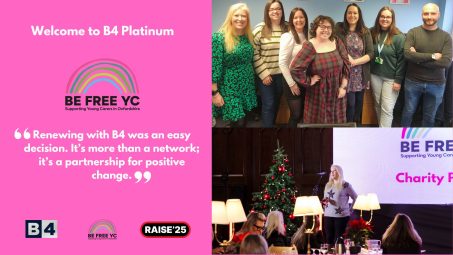
Be Free Young Carers joins B4 Platinum and confirms £1,000 Big...
We are pleased to announce that Be Free Young Carers, who joined B4 in 2023, have now joined B4 Platinum.
From this author
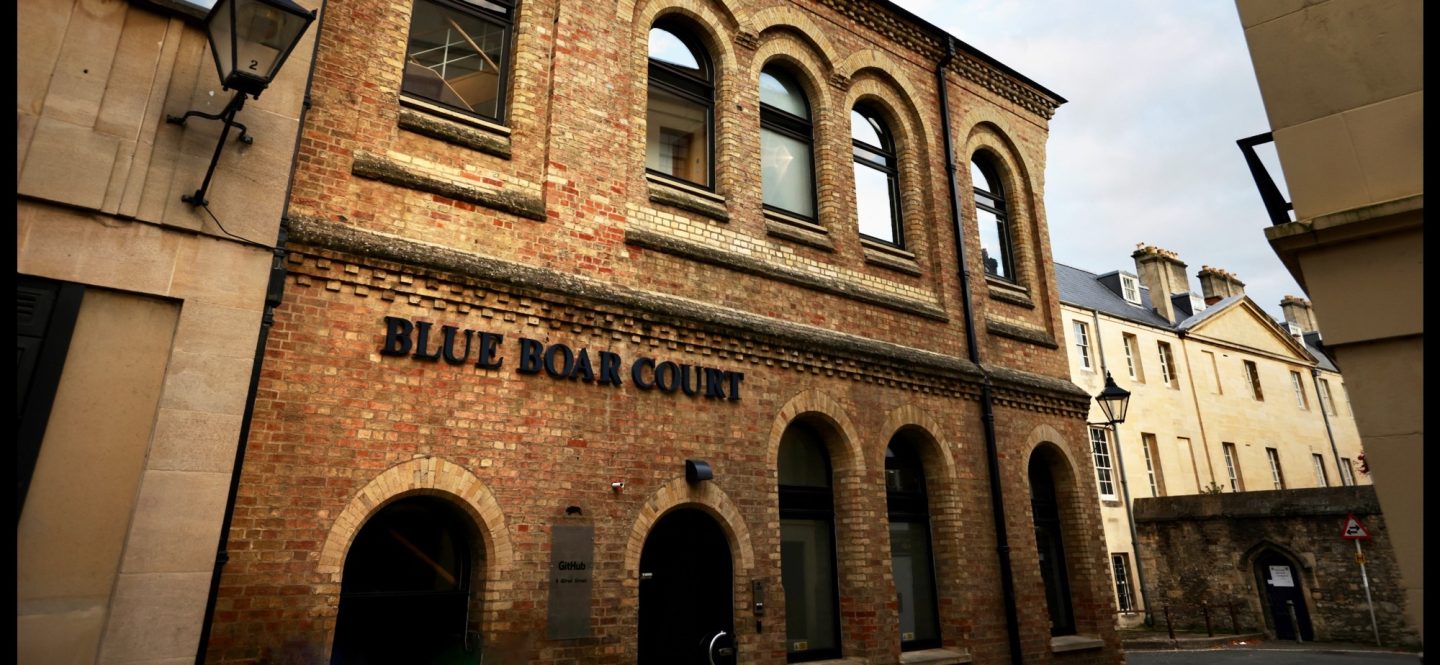
Seven companies relocating to The Oxford Trust’s new Oxford Centre for...
Seven science and tech start-ups and SMEs are to move from The Oxford Trust’s current Oxford Centre for Innovation to its new location at Blue Boar Court, Alfred Street, in Oxford’s city centre.
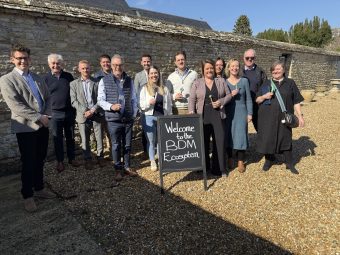
The Numbers Don’t Lie
B4 Ecosystems are an opportunity for B4 Members to share challenges, be inspired and learn from experts in their field. They began with our Business Development Ecosystem back in March 2023, which has been lead from day one by the always impressive Caroline O’Connor of Fourth Born. Caroline has been leading from the front as our other Ecosystems learn from her impressive example. Article by B4’s Richard Rosser

Bicester Motion promotes Jonty Ashworth to development director
Bicester Motion, the 444-acre future mobility estate in Oxfordshire, has promoted Jonty Ashworth to development director.


